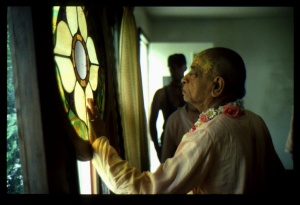SB 6.3.30: Difference between revisions
No edit summary |
(Vanibot #0054 edit - transform synonyms into clickable links, which search similar occurrences) |
||
| Line 23: | Line 23: | ||
<div class="synonyms"> | <div class="synonyms"> | ||
''tat'' | ''[//vanipedia.org/wiki/Special:VaniSearch?s=tat&tab=syno_o&ds=1 tat]'' — that; ''[//vanipedia.org/wiki/Special:VaniSearch?s=kṣamyatām&tab=syno_o&ds=1 kṣamyatām]'' — let it be excused; ''[//vanipedia.org/wiki/Special:VaniSearch?s=saḥ&tab=syno_o&ds=1 saḥ]'' — He; ''[//vanipedia.org/wiki/Special:VaniSearch?s=bhagavān&tab=syno_o&ds=1 bhagavān]'' — the Supreme Personality of Godhead; ''[//vanipedia.org/wiki/Special:VaniSearch?s=puruṣaḥ&tab=syno_o&ds=1 puruṣaḥ]'' — the Supreme Person; ''[//vanipedia.org/wiki/Special:VaniSearch?s=purāṇaḥ&tab=syno_o&ds=1 purāṇaḥ]'' — the oldest; ''[//vanipedia.org/wiki/Special:VaniSearch?s=nārāyaṇaḥ&tab=syno_o&ds=1 nārāyaṇaḥ]'' — Lord Nārāyaṇa; ''[//vanipedia.org/wiki/Special:VaniSearch?s=sva&tab=syno_o&ds=1 sva]-[//vanipedia.org/wiki/Special:VaniSearch?s=puruṣaiḥ&tab=syno_o&ds=1 puruṣaiḥ]'' — by my own servants; ''[//vanipedia.org/wiki/Special:VaniSearch?s=yat&tab=syno_o&ds=1 yat]'' — which; ''[//vanipedia.org/wiki/Special:VaniSearch?s=asat&tab=syno_o&ds=1 asat]'' — impudence; ''[//vanipedia.org/wiki/Special:VaniSearch?s=kṛtam&tab=syno_o&ds=1 kṛtam]'' — performed; ''[//vanipedia.org/wiki/Special:VaniSearch?s=naḥ&tab=syno_o&ds=1 naḥ]'' — of us; ''[//vanipedia.org/wiki/Special:VaniSearch?s=svānām&tab=syno_o&ds=1 svānām]'' — of my own men; ''[//vanipedia.org/wiki/Special:VaniSearch?s=aho&tab=syno_o&ds=1 aho]'' — alas; ''[//vanipedia.org/wiki/Special:VaniSearch?s=na&tab=syno_o&ds=1 na] [//vanipedia.org/wiki/Special:VaniSearch?s=viduṣām&tab=syno_o&ds=1 viduṣām]'' — not knowing; ''[//vanipedia.org/wiki/Special:VaniSearch?s=racita&tab=syno_o&ds=1 racita]-[//vanipedia.org/wiki/Special:VaniSearch?s=añjalīnām&tab=syno_o&ds=1 añjalīnām]'' — folding our hands together to beg Your pardon; ''[//vanipedia.org/wiki/Special:VaniSearch?s=kṣāntiḥ&tab=syno_o&ds=1 kṣāntiḥ]'' — forgiveness; ''[//vanipedia.org/wiki/Special:VaniSearch?s=garīyasi&tab=syno_o&ds=1 garīyasi]'' — in the glorious; ''[//vanipedia.org/wiki/Special:VaniSearch?s=namaḥ&tab=syno_o&ds=1 namaḥ]'' — respectful obeisances; ''[//vanipedia.org/wiki/Special:VaniSearch?s=puruṣāya&tab=syno_o&ds=1 puruṣāya]'' — unto the person; ''[//vanipedia.org/wiki/Special:VaniSearch?s=bhūmne&tab=syno_o&ds=1 bhūmne]'' — supreme and all-pervading. | ||
</div> | </div> | ||
Latest revision as of 22:39, 18 February 2024

A.C. Bhaktivedanta Swami Prabhupada
TEXT 30
- tat kṣamyatāṁ sa bhagavān puruṣaḥ purāṇo
- nārāyaṇaḥ sva-puruṣair yad asat kṛtaṁ naḥ
- svānām aho na viduṣāṁ racitāñjalīnāṁ
- kṣāntir garīyasi namaḥ puruṣāya bhūmne
SYNONYMS
tat — that; kṣamyatām — let it be excused; saḥ — He; bhagavān — the Supreme Personality of Godhead; puruṣaḥ — the Supreme Person; purāṇaḥ — the oldest; nārāyaṇaḥ — Lord Nārāyaṇa; sva-puruṣaiḥ — by my own servants; yat — which; asat — impudence; kṛtam — performed; naḥ — of us; svānām — of my own men; aho — alas; na viduṣām — not knowing; racita-añjalīnām — folding our hands together to beg Your pardon; kṣāntiḥ — forgiveness; garīyasi — in the glorious; namaḥ — respectful obeisances; puruṣāya — unto the person; bhūmne — supreme and all-pervading.
TRANSLATION
[Then Yamarāja, considering himself and his servants to be offenders, spoke as follows, begging pardon from the Lord.] O my Lord, my servants have surely committed a great offense by arresting a Vaiṣṇava such as Ajāmila. O Nārāyaṇa, O supreme and oldest person, please forgive us. Because of our ignorance, we failed to recognize Ajāmila as a servant of Your Lordship, and thus we have certainly committed a great offense. Therefore with folded hands we beg Your pardon. My Lord, since You are supremely merciful and are always full of good qualities, please pardon us. We offer our respectful obeisances unto You.
PURPORT
Lord Yamarāja took upon himself the responsibility for the offense committed by his servants. If the servant of an establishment makes a mistake, the establishment takes responsibility for it. Although Yamarāja is above offenses, his servants, practically with his permission, went to arrest Ajāmila, which was a great offense. The nyāya-śāstra confirms, bhṛtyāparādhe svāmino daṇḍaḥ: if a servant makes a mistake, the master is punishable because he is responsible for the offense. Taking this seriously, Yamarāja, along with his servants, prayed with folded hands to be excused by the Supreme Personality of Godhead, Nārāyaṇa.